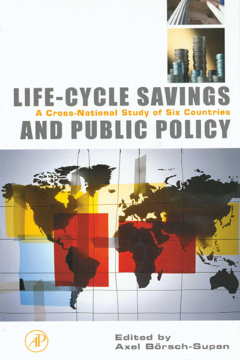
Additional Information
Book Details
Abstract
Life-Cycle Savings and Public Policy examines data on many households from a number of different countries. The hope is that through these observations we can learn about the ways policies affect savings, and that other differences among savers can be controlled for, instead of being blamed on cultural differences.
This book features a consistent framework among chapters. It reaches a harmony between measurement and analysis to compare accurately the resulting data and statistics. It provides econometric methodology to reveal the way policies affect savings. The book features data on household savings in Germany, Italy, Japan, the Netherlands, the U.K., and the U.S.
This book is recommended reading for anyone interested in saving, social insurance policy, or capital formation.
- Features a consistent framework among chapters
- Reaches a harmony between measurement and analysis to compare accurately the resulting data and statistics
- Provides econometric methodology to reveal the way policies affect savings
"How do social security programs and private financial institutions, such as the rules governing mortgage borrowing, affect household saving? This volume meticulously analyzes panel data from six nations to offer new insights on both of these long-standing questions. The results are essential reading for anyone interested in saving, social insurance policy, or capital formation." --James Poterba, Mitsui Professor of Economics, Massachusetts Institute of Technology
"This valuable set of studies takes an enormous step towards resolving the puzzling differences in saving rates between countries by focusing on the complex interaction between public policies and individual motives to save. The volume is critical to readers seeking to understand the effects of social policies on national saving and to those trying to deal with public pension 'crises' in developed countries." --Steven F. Venti, Department of Economics, Dartmouth College, Hanover, New Hampshire, U.S.A.
